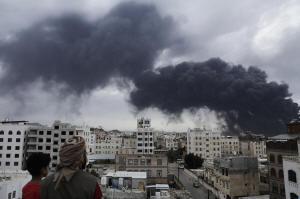Israel says it has disabled Yemen's main airport with airstrikes against
rebels
[May 07, 2025]
By ELENA BECATOROS and JON GAMBRELL
JERUSALEM (AP) — The Israeli military bombed the airport in Yemen's
rebel-held capital Tuesday, claiming to have disabled the airfield in an
attack that left commercial aircraft burning on the tarmac as its
fighter jets struck power plants and other targets.
The rare daytime attack on Sanaa, held by Yemen's Iranian-backed Houthi
rebels since 2014, came as part of a second day of Israeli airstrikes in
response to a Houthi ballistic missile striking the grounds of
Ben-Gurion International Airport near Tel Aviv. The Houthis described
the Israeli attacks as killing at least seven people and wounding 74
others over two days.
But the future of American attacks on the Houthis, who have pledged to
continue to target Israel, was thrown into question after U.S. President
Donald Trump said America would stop striking the Houthis. Trump
described the rebels as having “capitulated” and agreed to stop
targeting shipping in the Red Sea, though the rebels did not
specifically acknowledge such a pledge.
“We indirectly informed the Americans that the continued escalation will
affect the criminal Trump’s visit to the region, and we have not
informed them of anything else," said Mahdi al-Mashat, head of the
Houthi’s supreme political council, in a statement carried by the
rebel-controlled SABA news agency early Wednesday. Trump is due to visit
Saudi Arabia, Qatar and the United Arab Emirates next week.
Badr al-Busaidi, the foreign minister of Oman who mediated between the
U.S. and the Houthis, also is mediating between America and Iran over
Tehran's rapidly advancing nuclear program.
“Today's news about the situation in the Red Sea means that diplomatic
efforts have lead to the end to the conflict between the US and Ansar
Allah in Yemen,” al-Busaidi wrote on the social platform X, using
another name for the Houthis. “They will no longer target each other,
ensuring freedom of navigation for international commercial shipping in
the Red Sea.”

Israeli attack leaves Sanaa airport in ruins
The strikes in Sanaa came shortly after Israel’s military warned on
social media that people should leave the area immediately, saying that
“failure to evacuate the area endangers your lives.” The explosions from
the strikes echoed across Sanaa, sending the public fleeing to find
cover as thick black smoke rose over the skyline.
The Houthis' al-Masirah satellite news channel later aired footage from
the airport, showing its terminal's windows blown out, with concrete
blocks exposed and a fire burning inside. On its runway, aircraft
associated with the state carrier Yemenia burned.
The airline later said three of its planes had been “taken out of
service” in the attack, though those abroad in Jordan were untouched.
The Israeli strike came after its flight to Amman on Tuesday took off.
Other strikes hit a cement plant and power plants, the Houthis and
Israelis both said. On Monday, Israel targeted Houthi rebels in Yemen’s
Red Sea province of Hodeida, hitting a key port there and another cement
factory.
Israel’s defense minister, Israel Katz, said the strike should be seen
as a warning to the “head of the Iranian octopus,” which he said bears
direct responsibility for attacks by the Houthis against Israel.
The Israeli airstrikes involved some 50 bombs and “dozens” of aircraft,
the Israeli military said. It also required mid-air refueling to reach
Sanaa, showing their reach also to Iran as Israel has threatened to
strike Tehran's nuclear enrichment sites.
[to top of second column]
|

Yemenis watch as smoke billows following Israeli airstrikes
targeting a power plant and Sanaa Airport, in Sanaa, Yemen, Tuesday,
May 6, 2025. (AP Photo/Osamah Abdulrahman)

Houthi attacks on Israel linked to war in Gaza
Sunday’s missile attack struck an access road near Israel’s main
airport near Tel Aviv, briefly halting flights and commuter traffic.
Four people were slightly injured. It was the first time a missile
struck the grounds of Ben-Gurion airport since the October 2023
start of the war in Gaza. While most missiles launched by the
Houthis have been intercepted, some missiles and drones have
penetrated Israel’s air defenses.
The Houthis have targeted Israel throughout the war in Gaza in
solidarity with Palestinians there, while also targeting commercial
and naval vessels on the Red Sea. That raised their profile both at
home amid Yemen's decadelong war and abroad as the last member of
Iran’s self-described “Axis of Resistance” capable of launching
regular attacks on Israel.
The U.N. special envoy for Yemen, Hans Grundberg, said the latest
strikes carried out on Israel and Yemen’s airport marked a “grave
escalation in an already fragile and volatile regional context.” He
urged the parties to show restraint.
In March, Trump had vowed to use “overwhelming lethal force” after
the Houthis said they would resume attacks on ships sailing off
Yemen in response to Israel’s mounting another blockade on the Gaza
Strip.
Trump told reporters Tuesday that the U.S. “will stop the bombings.
They have capitulated, but more importantly, we will take their word
that they say they will not be blowing up ships anymore.” Trump
added, “I think that’s very positive. They were knocking out a lot
of ships.”
Data from Lloyd's List suggests larger shipping firms are slowly
beginning to return to the Red Sea, though traffic through the
waterway that once saw $1 trillion in goods a year pass through it
remains low.
Israel has repeatedly targeted the Houthis. It struck Hodeida and
its oil infrastructure in July after a Houthi drone attack killed
one person and wounded 10 in Tel Aviv.
In September, Israel struck Hodeida again, killing at least four
people after a missile targeted Ben-Gurion airport as Prime Minister
Benjamin Netanyahu was returning to the country. In December,
Israeli strikes killed at least nine people in Hodeida.

Also Tuesday, Israel continued its strikes in Gaza. At least 18
people were killed, including children, when a school sheltering
displaced people was hit in Bureij, according to Khalil Al- Dokran,
spokesperson for al-Aqsa Hospital, where some of the bodies were
taken.
___
Gambrell contributed from Dubai, United Arab Emirates. Associated
Press writers Julia Frankel in Jerusalem, Melanie Lidman in Tel
Aviv, Israel, and Will Weissert in Washington contributed to this
report.
All contents © copyright 2025 Associated Press. All rights reserved |